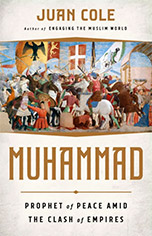Career foreign service officer, Benjamin Tua, who served in Brazil, Japan and Muslim-majority countries such as Kyrgyzstan, reviews my new book Muhammad: Prophet of Peace amid the Clash of Empires for American Diplomacy.
Tua writes, that it
- “is perfect for the reader who knows little about Mohammad’s life and origins as a member of a tribe that settled feuds in Mecca, about Islam and its pragmatic, peace-oriented tenets, or about the historical and geo-political context of Islam’s emergence.”
Tua observes,
- “For a book that, as the author tells the reader, “has been gestating for decades,” it is remarkably short — 208 pages of text. But it includes . . . 61 excerpts from some 28 of the 114 surahs (chapters) of the Qur’an (The Recitation). The excerpts buttress Cole’s argument that the Qur’an and early Islam were strongly imbued with values of compromise and peacemaking.”
He adds,
- “Pagan and Christian concepts of “just war”, including the Zone of Peace (the shared sacred city of Mecca and the Kaaba) and the Season of Peace, became part of Islamic, Qur’an-based doctrine, such as non-aggressive war, proportionate response to wrongs, and the treatment of prisoners. The Qur’an, Cole explains, largely concurs with Augustine and Ambrose on the subject of just war, “seeing battle as a legitimate response to aggression.” The Qur’an also contains prohibitions against plunder in war and indiscipline. Cole tells us, Christians have underreported the peaceful universalistic aspects of the Qur’an and Islam.”
Read the whole thing.



 © 2026 All Rights Reserved
© 2026 All Rights Reserved